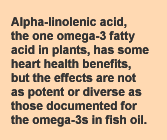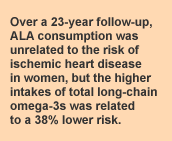Alpha-Linolenic Acid from Plants Unrelated to Risk of Ischemic Heart Disease
 There is a wealth of data to back up recommendations for the consumption of fatty fish or long-chain omega-3 fatty acids to reduce the risk of heart disease mortality. Much less evidence supports the consumption of alpha-linolenic acid (ALA), the one omega-3 found in plants, for heart health. This omega-3 is shorter and less unsaturated than EPA and DHA, the main omega-3s in fish. True, ALA has some heart health benefits, but the effects are not as potent or diverse as those documented for the omega-3s in fish oil. When you read that omega-3s are found in fish, egg yolks, walnuts and flaxseed oil, the statement is true, but the effects are not equivalent among these sources. It is of continuing interest, however, to find out how useful ALA may be in protecting heart health. After all, people consume much more ALA than long-chain omega-3s.
There is a wealth of data to back up recommendations for the consumption of fatty fish or long-chain omega-3 fatty acids to reduce the risk of heart disease mortality. Much less evidence supports the consumption of alpha-linolenic acid (ALA), the one omega-3 found in plants, for heart health. This omega-3 is shorter and less unsaturated than EPA and DHA, the main omega-3s in fish. True, ALA has some heart health benefits, but the effects are not as potent or diverse as those documented for the omega-3s in fish oil. When you read that omega-3s are found in fish, egg yolks, walnuts and flaxseed oil, the statement is true, but the effects are not equivalent among these sources. It is of continuing interest, however, to find out how useful ALA may be in protecting heart health. After all, people consume much more ALA than long-chain omega-3s.
Researchers in Denmark conducted a long-term study of healthy men and women between the ages of 30 and 70 years. They were interested in learning which foods and nutrients were related to the risk of developing ischemic heart disease. This is the leading type of heart disease in Western countries and arises from an undersupply of blood to the heart as a result of narrowed coronary arteries. The investigators looked at the association between intakes of ALA, all omega-3s and linoleic acid, an omega-6 fatty acid, and the risk of developing ischemic heart disease. Participants were monitored for 23 years.
 Over the study period, neither ALA nor linoleic acid consumption was related to ischemic heart disease in men and women. However, in women, greater consumption of total long-chain omega-3s was related to a 38% lower risk of the disease compared with participants having low intakes. The association was not observed in men. The authors suggested that one reason why ALA was not associated with disease or mortality risk was that intakes of linoleic acid were very high. As these two fatty acids compete with each other for enzymes, the odds would work against ALA. Another point not mentioned by the authors is that more than half of ALA is oxidized for energy, whereas linoleic acid is not.
Over the study period, neither ALA nor linoleic acid consumption was related to ischemic heart disease in men and women. However, in women, greater consumption of total long-chain omega-3s was related to a 38% lower risk of the disease compared with participants having low intakes. The association was not observed in men. The authors suggested that one reason why ALA was not associated with disease or mortality risk was that intakes of linoleic acid were very high. As these two fatty acids compete with each other for enzymes, the odds would work against ALA. Another point not mentioned by the authors is that more than half of ALA is oxidized for energy, whereas linoleic acid is not.
As others have reported, ALA was not related to a lower risk of ischemic heart disease mortality in Danish adults monitored for 23 years. Higher intakes of long-chain omega-3s were associated with a 38% lower risk in women, but not men.

